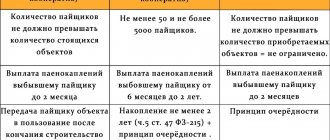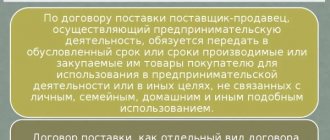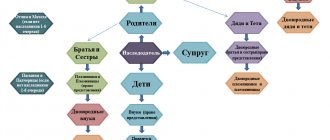Highlights of Resolution No. 9 of May 29, 2012
The Decree of the PVS of the Russian Federation explains both the general rules and the specifics of special cases when entering into inheritance. In addition to considering issues of resolving disputes regarding inheritance, its opening and composition, circle of successors, etc., the Plenum examines in detail the grounds for inheritance.
Thus, the PVS distinguishes between the receipt of inherited property by law and by will as different chapters.
The judges of the Supreme Court paid special attention to the issues of acquiring and receiving successive property, entering into and renouncing inheritance rights. General provisions:
- regulate succession relations and the norms of the Civil Code in force at the time of opening of inheritance;
- the responsibilities of the deceased, in addition to those inextricably linked with himself, are also included in the inheritance mass;
- according to paragraph 16, persons who died at the same time do not inherit from each other (the judges of the Supreme Court separately clarify what can be considered a simultaneous death);
- paragraphs 17-18 explain what is meant by the place of opening of the inheritance and how it should be determined, based on existing documents, the value of the property, etc.;
- in private situations, the fact of the place of opening of the inheritance is determined by the judge.
PVS position on recognition as an unworthy heir:
- loss of rights to inheritance occurs without taking into account the goals and motives of the unworthy successor, if deliberate criminal acts take place;
- the successor is recognized as unworthy by the notary;
- the court only confirms the illegality of the actions.
Resolutions of the Plenum do not have normative force and are advisory in nature.
Norms of international law and international treaties of the Russian Federation (Article 7 of the Civil Code of the Russian Federation)
Not only Russian representatives, but also foreign residents have the right to act as acquirers within the framework of inheritance. For notarial or judicial division, the need to use both domestic and international regulatory frameworks is revealed. It is represented by succession arrangements signed between specific countries.
International guarantors do not act as separate legislation, but in practice serve as an integral element of the legal field of the Russian Federation. Nevertheless, if any contradictions are identified between internal and external legislation, preference in the judicial system is given to the second (if it is actually involved in inheritance).
Inheritance by will
The rights of the testator to dispose of property were explained by the PVS in paragraphs 22-27. Thus, the Supreme Court judges explained that the testator has the right to cancel or change the will.
In addition, the resolution spells out special situations of inheritance disputes, when, by the will of the deceased, the successors are obligated to provide other persons with the right to use the received property.
The resolution of the Plenum on inheritance also contains a detailed consideration of the testamentary refusal, which, according to Art. 1137 of the Civil Code of the Russian Federation may be present in the will. The judges of the Supreme Court determined that a period of three years for obtaining a refusal is precluded.
The successors who received the inheritance make a joint and several refusal in accordance with the shares received. Clause 27 defines the conditions under which a will is recognized as void and the situations in which the court has the authority to recognize it as invalid.
Dear readers! To solve your problem right now, get a free consultation
— contact the on-duty lawyer in the online chat on the right or call:
+7
— Moscow and region.
+7
— St. Petersburg and region.
8
- Other regions of the Russian Federation
You will not need to waste your time and nerves
- an experienced lawyer will take care of solving all your problems!
Other acts containing civil law norms
In practice, government acts and presidential orders should not contradict the Civil Code and all-Russian laws. To implement the law and protect the interests of citizens, the guarantees of international law on inheritance must be observed.
Decrees of the President of the Russian Federation (clause 3 of article 3 of the Civil Code)
If inconsistencies are identified between the new presidential decree and the current legislative framework on inheritance, the State Code of the Russian Federation or the law amending it remains a priority for the court.
Decrees of the Government of the Russian Federation (clause 4 of article 3 of the Civil Code)
Government regulations are another level or side of the rule-making activity required for judicial proceedings. Due to the fact that there is a division of power in Russia, the directives of the government apparatus are approximately on the same level in the hierarchy as presidential decrees on inheritance. But they all obey the Code.
Regulatory acts of ministries and other federal executive authorities (clause 7 of article 3 of the Civil Code)
The regulation of the inheritance process at the instigation of such power structures takes place solely on the basis of a higher regulatory framework. The purpose of internal acts is to clarify national standards. Executive authorities are responsible for the correct reading of the law and its use in practice.
Registration of inheritance according to law
Inheritance by law is discussed in paragraphs 28-33. Thus, paragraphs 28-29 clarify questions regarding the successors of the first and seventh circle, the consequences of divorce for the heir-spouse.
The PVS also pays attention to the issue of inheritance by disabled dependents, within the framework of which it examined the conditions for their calling to succession. The Supreme Court clarified who is considered disabled, how to prove the fact of dependency, etc.
Paragraph 32 of the resolution discusses what facts are important to take into account when resolving disputes regarding the obligatory share in the inheritance. Clause 33 discusses situations of separating a spouse’s share from all property. Registration of succession begins with determining the place of opening of the inheritance.
It is understood as the last registered address of the deceased. In the absence of registration, the inheritance is opened according to the location of more than half of the property. The place of opening is confirmed by a certificate of the last residential address, an extract from the house register or from the EPPN. Next, documents are collected to enter into inheritance according to the law.
Required papers:
- death certificate;
- certificate from the deceased’s last place of residence;
- documents certifying the relationship of the heir to the deceased;
- documents establishing the deceased's right to property.
Then an application for acceptance of the inheritance is submitted to the notary; it is drawn up in free form, but must contain the following information:
- Full name of the deceased and successor;
- date of death and place of last residence;
- confirmation of the successor’s readiness to enter into inheritance;
- grounds for entering into rights;
- date of application.
Then you need to pay the state fee and provide the receipt to the notary.
Expert opinion
Irina Vasilyeva
Civil law expert
The cost of issuing a certificate of inheritance depends on its estimated size and is: for children, spouses, parents, brothers and sisters - 0.3%; for other heirs – 0.6%.
Acts of authorities and management of constituent entities of the Russian Federation and local governments (clause 1 of article 8 of the Civil Code)
Legislation common to all territorial-administrative units is formed through decision-making by the main state apparatus. However, in practice, the admission of territorial government agencies to rule-making is not excluded. It is worth noting that this mainly concerns issues of local real estate, and not inheritance.
Inheritance cases have uniform sources of regulation throughout Russia. It is because of this that successors, notaries and executors can safely cross the boundaries of notarial districts without thinking that alternative laws regarding inheritance and issues of access to the judicial system apply in their territory.
In practice, the conduct of claims and judicial debates occurs to a greater extent under the influence of the Civil Procedure Code. Here there is a precise definition of the content of the claim, the rules for filing it, as well as the rules for consideration by the judge. There is also a description of the possible results and further consequences of the litigation.
Certain types of property
In a separate chapter, Resolution No. 9 explains issues related to this type of inheritance, such as unauthorized development on registered plots, shares in cooperatives, partnerships and other similar organizations.
According to the decree, unregistered buildings on a registered plot can also be part of the inheritance, but a will can only be made for land. Thus, heirs not included in the will must be compensated for the estimated value of buildings in accordance with the general procedure.
Shares in cooperatives or partnerships can be inherited if the documents for them are properly prepared by the testator and if full payment for them is made under the appropriate agreement. If there is a debt in payments, then the heirs will receive a share in the amount minus this unpaid debt.
If the testator was bound by obligations to pay rent, then this obligation also applies to the heirs in accordance with the terms of the contract that the deceased citizen had.
If the testator had state awards, then they are not included in the inheritance. And if he was entitled to any payments related to his means of subsistence, then these funds are paid to the heirs.
Escheat
The most heated disputes between heirs accompany the division of property. This is especially true for housing, land plots, and shares. Judicial panels of the second and higher instances often put an end to “family” relationships.
Case No. 2-1065/2017
The decision in case No. 2-1065/2017 divided the property in compliance with the priority rights of the heirs - the minor children of the testator and the widow. The court determined the proportions of shares. Since the defendant’s share was insignificant - 1/8 of all real estate - the court decided on monetary compensation for the share of the inherited real estate. The interests of minors were taken into account when making the decision.
Case No. 2-1374/2015
The decision in case No. 2-1374/2015 resolved property disputes between the heir under the will and the law. The widow received the bulk of the property under the will. A daughter recognized as disabled has the right to a compulsory share. The court imposed reimbursement of expenses for the maintenance of the inherited property, protection and management on both participants in the process, in proportion to the value of each property.
In situations where there are no heirs of all orders, the property passes to the state. Unclaimed land shares in a timely manner, not registered and not processed, are also considered escheat. They are transferred to the municipality or rural settlement by court decision.
Case No. 2-37/2018
Case No. 2-37/2018 was heard at the initiative of officials to recognize the ownership rights of the Moscow Region to the unclaimed shares of the deceased. The court noted that in anticipation of the court hearing, the administration posted information about plots that may be considered unclaimed. It was established that none of the heirs lay claim to the agricultural land. The plot became the property of the municipality.
Case No. 2-2/2018
Case No. 2-2/2018 was initiated by the administration’s claim against citizens who inherited the agricultural lands of the former state farm. They did not make a division in kind, and no inheritance cases were opened for the disputed plots. The court recognized the right of municipal ownership of the disputed plots.
On the division of inherited property
The most heated disputes between heirs accompany the division of property. This is especially true for housing, land plots, and shares. Judicial panels of the second and higher instances often put an end to “family” relationships.
Case No. 19-КГ16-1
Case No. 19-КГ16-1 was considered by the Supreme Court of the Russian Federation on a cassation appeal by the testator's widow. The district court determined to pay monetary compensation to the daughter of the deceased for her share. It was three times the amount offered by the plaintiff. The regional court dismissed the appeal. The Supreme Court of the Russian Federation considered the plaintiff’s arguments regarding the compensation amount to be exhaustive.
Local acts of legal entities
The statutory and constituent documentation can also contain in practice the rules of inheritance, or rather, come out of them and then translate them. This is how the legal framework applies to inheritance funds, permission for the creation of which appeared in Russia quite recently (20018).
Fund specificity is that their creation occurs in accordance with the regulatory framework and follows from the will of the deceased (a type of unilateral transaction or some kind of agreement). Further, the existence of the fund is regulated by general legislative theses regarding the functioning of any organizations and specific rules of inheritance.
Judicial and arbitration practice (clause 1 of article 8 of the Civil Code)
Claims on the topic of inheritance in judicial practice constitute statistics of precedents. This helps in reading the law when trying cases. Accordingly, when introducing new rule-making acts, there is no data on judicial practice, which complicates the task of correct interpretation.
Discrepancies are identified based on the professional judge's opinion, the specificity of a particular situation and the legal preparedness of the parties to the litigation. Therefore, in similar inheritance cases, completely different decisions are often found. Explanations on existing judicial practice (including problems of inheritance) are given by the Plenum of the Supreme Court in its decisions.
A party dissatisfied with the result may try to appeal the court decision using the appeal system adopted in Russia. However, after the decision of the presidium (not the plenum) of the Supreme Court is adopted, citizens cannot appeal it.
The scheme for appealing a primary judicial decision in practice is as follows:
- Appeal petition.
- Cassation claim.
- Complaint or letter to the Supreme Court.
The jurisdiction and jurisdiction of discussions about inheritance is an important detail. The nature of the hereditary mass and the essence of the dispute are of great importance for calculating such parameters. If we are talking about financial benefits and the appearance of a legal entity, then the case may be referred to the Arbitration Court. This practice concerns the functionality of the inheritance fund created according to the last will of the testator.







